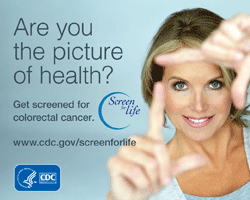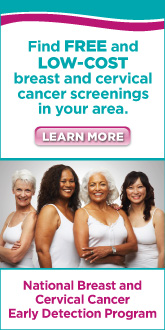Cancers Diagnosed at Late Stages Despite Available Screening Tests
Almost half of the colorectal and cervical cancer cases and a third of the breast cancer cases in the United States are diagnosed at late stages, when treatment is more difficult, according to "Surveillance of Screening-Detected Cancers (Colon and Rectum, Breast, and Cervix)—United States, 2004–2006," published November 26, 2010.
In this first report to highlight the nationwide incidence of late-stage cancer diagnosis and cancer screening prevalence, the incidence rates of late-stage cancers differed by age, race/ethnicity, and state.
Researchers examined stage-specific cancer incidence rates and screening prevalence for breast, cervical, and colorectal cancer by demographic characteristics in states. National data on new cancer cases were obtained from cancer registries affiliated with CDC's National Program of Cancer Registries and the National Cancer Institute's Surveillance, Epidemiology and End Results program. State-level cancer screening data were obtained from CDC's Behavioral Risk Factor Surveillance System.
Significant Findings
Demographic Incidence Rates
- Incidence rates of late-stage colorectal cancer increased with age and were highest among black men and women.
- Incidence rates of late-stage breast cancer were highest among women aged 70–79 years and black women.
- Incidence rates of late-stage cervical cancer were highest among women aged 50–79 years and Hispanic women.
State Incidence Rates
- Late-stage colon and rectum incidence rates ranged from 51.0 to 86.5, and were highest in Connecticut, Delaware, Illinois, Iowa, Kentucky, Louisiana, Maine, Nebraska, New Jersey, and Pennsylvania.
- Late-stage breast cancer incidence rates ranged from 92.2 to 132.1, and were highest in Alabama, the District of Columbia, Kansas, Louisiana, Mississippi, New Jersey, Oklahoma, Pennsylvania, Tennessee, and Washington.
- Late-stage cervical cancer incidence rates ranged from 3.0 to 8.3, and were highest in Arkansas, the District of Columbia, Illinois, Kentucky, Louisiana, Mississippi, Nevada, New Mexico, and Oklahoma.
Authors of the report noted that differences in late-stage cancer diagnoses may be explained partially by differences in screening rates in locations, and among different demographic groups.
Recommended Screenings
The U.S. Preventive Services Task Force recommends the following evidence-based, population-based cancer screenings—
- Men and women aged 50–75 years should be screened for colorectal cancer with any of the three tests:tests: a fecal occult blood test every year, a flexible sigmoidoscopy every five years, or a colonoscopy every 10 years.
- Women aged 50–74 years should be screened for breast cancer with mammographymammography every two years.
- Women should begin screening for cervical cancer with the Pap testPap test within three years of beginning sexual activity or at age 21 years (whichever comes first). Furthermore, women should be screened annually with three consecutive normal Pap tests and then at least every three years up to age 64 years.
The Affordable Care Act provides insurance coverage of these recommended cancer screening tests by eliminating financial barriers such as co-pays, which is an important first step to increase the number of people who receive these services.
Contact Us:
- Centers for Disease Control and Prevention
Division of Cancer Prevention and Control
4770 Buford Hwy NE
MS K-64
Atlanta, GA 30341 - 800-CDC-INFO
(800-232-4636)
TTY: (888) 232-6348
8am–8pm ET
Monday–Friday
Closed on Holidays - cdcinfo@cdc.gov




